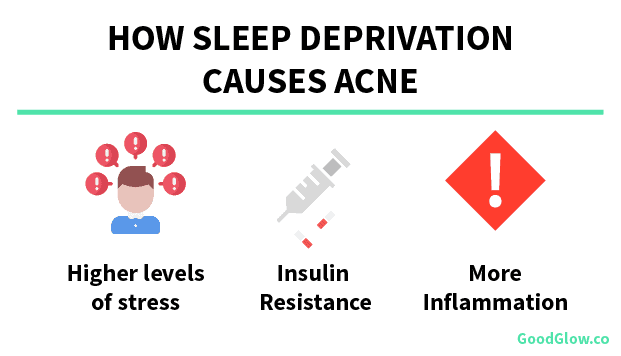If you’ve noticed an increase in acne while also getting less sleep than you should, it’s most likely not a coincidence.
Inadequate sleep can cause cortisol levels to rise, causing oil to build on the skin, plugging tiny pores, and eventually infecting them.
This infection causes a small pus-filled bump, also known as a pimple. Acne, especially acne caused by a lack of sleep, can be treated relatively easily at home if you are otherwise healthy.
If you take action to get your sleep schedule back on track now, you’ll likely see acne start to vanish in less than a week.
Check out this graphic below summarizing this issue:
5 Ways Lack of Sleep Causes Acne
1: Increases Hormone Level
When you don’t get enough sleep at night and wake up before you’re fully rested, you’ll feel foggy-headed, heavy, and tense. This is caused by an increase in cortisol levels in your blood.
Cortisol is a stress hormone that causes your sebaceous glands to oversecrete oil on your face. When excessive oil builds up on the skin, it clogs the pores and follicles.
These clogged pores harbor harmful bacteria that cause acne on your face.
As a result, the most important times to cleanse the face area are in the morning, after exercise, and before bed.
2: Increases Depression and Anxiety
Sleep deprivation disrupts not only your body’s hormones but also the chemicals in your brain. Anxiety and depression can be induced by a lack of sleep.
They are the two most common mental health conditions that cause your body to produce inflammatory responses.
When your body’s inflammatory response is activated, it can weaken the barrier function of your skin.
If your skin’s barrier function is weak, it will easily become infected as it is exposed to dust, bacteria, and sunlight throughout the day.
These harmful foreign objects will become trapped inside your skin’s pores, causing acne to form on your face.
3: Weak Immune System
I know it’s difficult to believe that not getting enough sleep can have disastrous consequences. However, inadequate sleep can weaken your immune system.
Our immune system protects our internal organs and helps defend the skin against germs and microbes.
If our defense mechanism is inefficient, tiny dust particles and microbes will begin to accumulate in the skin’s hair follicles.
Swelling and skin breakouts will result as a result of this. Sooner or later, pimples may appear. Getting enough sleep boosts the immune system and protects your skin from infections.
4: More Skin Breakouts and Dullness
Skin dehydration disrupts your skin’s natural moisture balance. It can cause your skin to become extremely dry and rough, which is why a good facial moisturizer is essential.
When we sleep, our bodies perspire, which helps to rebalance the hydration level in our skin. This demonstrates that our skin goes through a hydration process.
We miss out on the opportunity to replenish our skin with moisture when we don’t get enough sleep. As a consequence, the skin becomes more prone to irritation and dryness.
When the skin is dry, the sebum gland overworks to compensate for the lack of oil, resulting in excess oil and, eventually, acne on the face.
5: Disturbs Your Daily Routine
Sleep is the most important aspect of our lives. In fact, we spend nearly half our lives snoozing.
Not getting enough sleep not only disrupts our physical activities, but it also has an impact on our daily routine. Every day, our skin requires proper attention and care.
When you don’t have a good daily skincare routine, your skin becomes more sensitive and acne-prone.
As a result, even minor disruptions in your sleep can result in a slew of pimples.
3 Ways to Combat Acne Caused by Irregular Sleep
1: Get Proper Sleep (Common Sense)
The easiest solution to your problem is simply to get enough sleep. It’s not that difficult. We should manage sleep in the same way we manage other aspects of our daily lives.
Some people, no matter how hard they try, are unable to sleep properly.
If you’re overly stressed and unable to sleep, as a result, try to relax first. To keep your nerves under control, try meditation or low-intensity exercise.
If, on the other hand, you find yourself unable to sleep properly due to a heavy workload, learn to manage your workload and set time aside for rest.
2: Eat A Healthy, Low-Inflammation Diet
The second solution is also very simple and straightforward. Try to eat healthier if you want to fight acne. Eating healthy has numerous skin benefits.
First and foremost, a full stomach will help in getting a good night’s sleep. Second, fruits and vegetables are rich in minerals and vitamins.
They help to boost our immune systems and keep us healthy. They hydrate and nourish our skin while also protecting it from dehydration.
For glowing skin, consume juicy fruits such as watermelon, orange, peach, and apricot. To meet your mineral requirements, eat raw or cooked vegetables.
Read this article on diets that are friendly for acne-prone individuals.
3: Consult a Dermatologist
You’ve already secured the first measure toward better and healthier skin if you’ve started sleeping properly and stopped eating junk and unhealthy foods.
However, some acne can be stubborn, taking more time to heal and remove from your skin. In that circumstance, you should inquire for guidance from a dermatologist.
Dermatologists, also known as skin doctors, specialize in the treatment of skin problems. The doctor will prescribe you oral medications and ointments based on your skin condition.
After a one-month break, you may need to schedule three to four consultations. Lasers and dermabrasions are two other treatment options. All of these treatments have pros and cons.
Finding a good and dependable dermatologist is not as difficult as it may seem.
Frequently Asked Questions
Yes, both your pillowcase and your sheets can trigger acne breakouts. If you suffer from frequent acne breakouts or acne-prone skin it is essential to use a gentle non-comedogenic pillow case that will soothe your skin. If you deal with severe acne breakouts you should also make sure to wash your pillowcase 1-2 times per week to keep your skin’s oil from absorbing into your pillowcase
Yes, sleeping late and not sticking to a regular sleep schedule are harmful to health. If you sleep late at night, or if you sleep on time some nights but not others, your brain will be unable to create a proper sleep cycle. This is also bad for your mental health and increases your stress level.
All of this has an adverse result on our bodies and skin, resulting in acne formation. Our skin is a vulnerable organ, so keep that in mind.
If you have babies in your home, you’ve probably seen them cry when their mother puts them to bed. We all hated bedtime when we were kids. But as we get older, we crave it. A healthy adult should sleep 7 to 9 hours per day, according to recommendations. Our family responsibilities and work commitments sap all our energy. In the end, we typically end up sacrificing our sleep time to get as much done as we possibly can. However, our bodies require rest as well.
So, to stay sane, try to get at least 7 hours of sleep per day. If you have trouble falling asleep you should stay away from screens for at least two hours before going to bed and try your best to abstain from caffeine. If that does not work there are several supplements, like melatonin, that have a relatively low-risk profile and can help you fall asleep.
Getting rid of acne is like embarking on a difficult journey. To get rid of it, you must be patient, get enough sleep, eat a healthy diet, and exercise. The most unfortunate aspect of acne is that it leaves behind acne scars. Then comes another struggle in which you must work to remove the scars.
The good thing is that thanks to improvements in pharmaceutical corporations and medical technologies, there are therapy choices that will help you in achieving clear skin.
You can get rid of them in some cases, and your skin will be as it was before the acne.
Takeaway
Sleep deprivation leads to an unhealthy lifestyle and a cycle of ongoing health issues such as depression, anxiety, and a disrupted hormonal level, which promotes acne production.
Sleep deprivation also weakens our immune system. And an unhealthy body, unable to defend itself against harmful bacteria, is more prone to acne.
Make an attempt to adhere to a sleep program. Set the alarm not only for the morning but also for bedtime.
Along with that, try to eat healthily, drink more water, reduce stress, and exercise regularly. All of this will help you sleep better and lower your chance of developing acne.


